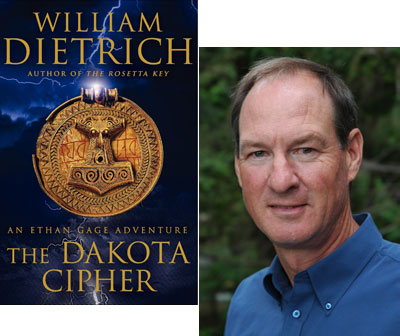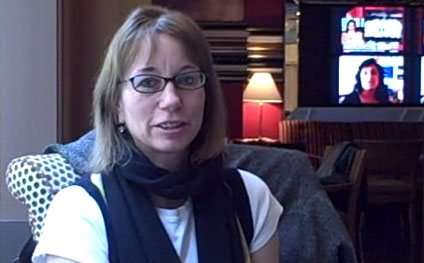William Dietrich & the Early Modern Swashbuckler

A few years back, I started reading a novel called Hadrian’s Wall by William Dietrich—I’d picked it on a whim, because it happened to come in the mail that day, and I wasn’t expecting much to start, but it turned out to be a genuinely compelling read; basically, Dietrich took the decline of the Roman Empire and bathed it in a 1950s noir atmosphere perfectly suited to the cultural decay and corruption. I was hooked by the end of the first chapter and pretty much read the thing straight through in just a day or two. Since then, Dietrich’s gone on to write a series of historical adventure-thrillers (the Hollywood pitch might go Flashman meets the Da Vinci Code) that has hit its third installment with the publication of The Dakota Cipher this week.
Napoleon’s Pyramids, the first book in the series, “was inspired by Bonaparte’s epic invasion of Egypt,” Dietrich recalled recently, introducing the essay that he’d written for Beatrice. “That episode was a clash of cultures between a European army and mysterious Muslim world, seen through the eyes of an American adventurer, Ethan Gage. The Dakota Cipher is also a time-machine trip through cultures, in which Ethan moves from the glittering chateaus of France to raw New York, a meeting with Thomas Jefferson in infant Washington, and then on to the frontier. There he brushes up against native American life and the frightening freedoms of the West.” My question: How did Dietrich hit upon this corner of history, and this hero?
In all my books I try to take my readers to a different world, be it Roman Britain, Antarctica, or the Holy Land in 1799. Ethan—a gambler, sharpshooter, treasure hunter, and romantic—is above all curious, and we see the dawn of our modern era through his wry perspective. I use humor and horror to give a rounded view of a period in which so many things began: The industrial and scientific revolutions, the conscription of whole populations in titanic wars, the birth of propaganda and the secret police, and Enlightenment ideas that inspired political change in the United States, France, and Britain.
My writing is inevitably influenced by my career as a newspaper journalist. Without quite planning to, I’ve found my heroes and heroines are usually observant adventurers thrust into new cultures and environments, which is a fair description of ambitious reporting. As a former environmental and science reporter, I also have a particular interest in how geography affects individuals and society. My books have vivid settings that characters react to.
Most important, I learned in the competitive world of journalism that if you don’t make it fun and interesting, it doesn’t get read. My novels are chock-full of love and war, treachery and triumph, twists and turns. Ethan has added a new dimension to my novels, because he has a self-deprecating sense of humor. He’s good company, which is why I keep writing books about him.
24 March 2009 | guest authors |
Literary Crosstraining With Laura Lippman

“Last year was insane, and I still feel like I’m trying to catch up,” Laura Lippman tells me as we chat in a café next to the offices of HarperCollins, which has published her novels under the William Morrow imprint for the last 15 years. In addition to writing Life Sentences, a stand-alone novel about a bestselling memoirist whose research into a criminal case involving one of her former classmates digs up all sorts of unsettling information, Lippman also agreed to write a 15-chapter serialized novella starring Tess Monaghan, the reporter-turned-private-eye Lippman introduced in her debut novel, 1997’s Baltimore Blues, and has stayed with for several sequels—interspersed with stand-alone novels, to be sure, but never in such a compressed time frame. (And that’s not even counting the short story collection, Hardly Knew Her, that came out last fall.)
When she was invited by the New York Times Sunday Magazine to write a serial, she sought the advice of two writer friends, Michael Connelly and Ian Rankin, who had previously taken part in the project: “I was hoping to be told it was okay to blow it off,” she laughs, but they assured her she really ought to take the paper up on the offer. So, although she doesn’t usually work from an outline, in order to make the serial fit into her schedule, she worked out the overarching narrative for 11 of the 15 chapters—but, to keep things surprising for herself, she decided each chapter would have its own mini-story…which she’d only discover while she was writing. She does, however, confess to slightly “cheating” on the serial format, in that she wrote the entire novella in advance, rather than on a week-by-week deadline. “I’m just too fond of revision,” she says.
“Life Sentences is one of the toughest books I’ve written,” Lippman added. “There were some really depressing days during the final draft.” She’s worked with the same editor, Carrie Ferron, since Baltimore Blues, and describes Ferron’s guidance as Socratic: “Carrie will tell me something is needed, but she won’t tell me the solution… For this novel, I took all the memoir sections [written in Cassandra’s voice] and put them in one document, and it came to 14,000 words. That was way too much.” She edited the material down by nearly half—6,000 words gone by the time she was through— “It was hard, but it was absolutely the essential thing to do. I’m always trying to acheive that feeling you get when every single word on the page absolutely has to be there, that it had been weighed and tried and earned its keep—and, sure, there’s plenty of times when that didn’t happen, but I still keep trying.”
23 March 2009 | interviews |

 Our Endless and Proper Work is my new book with Belt Publishing about starting (and sticking to) a productive writing practice.
Our Endless and Proper Work is my new book with Belt Publishing about starting (and sticking to) a productive writing practice. 
